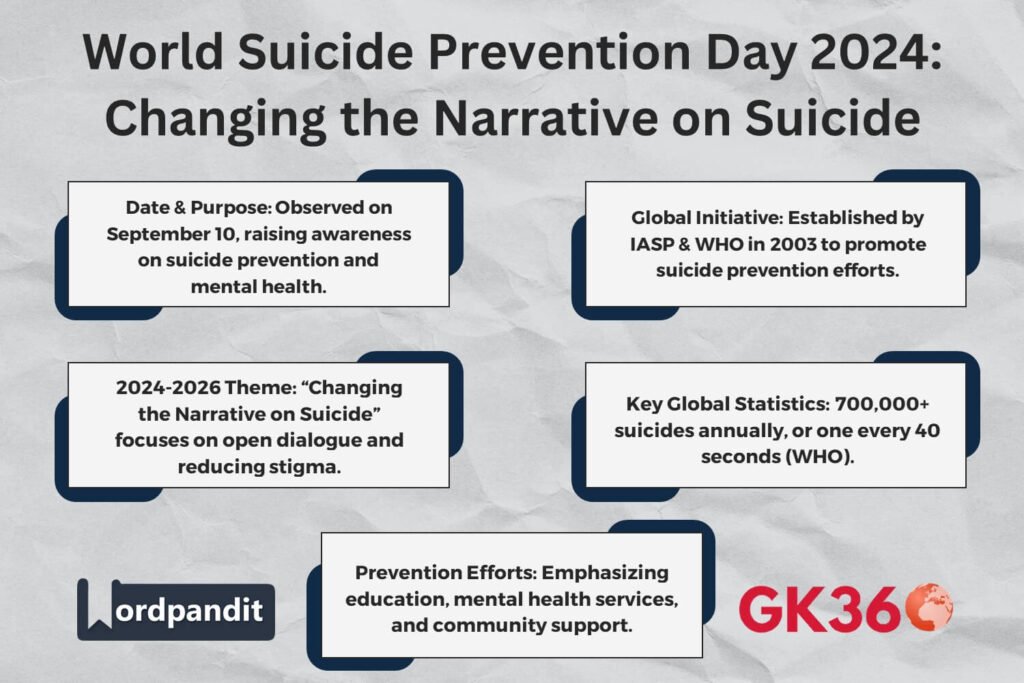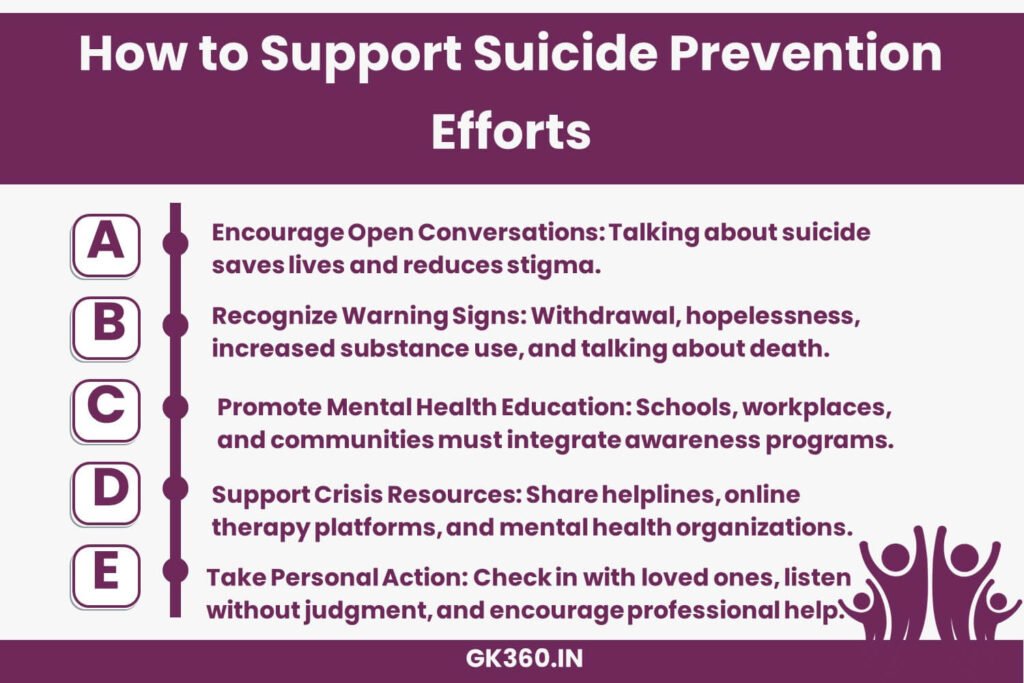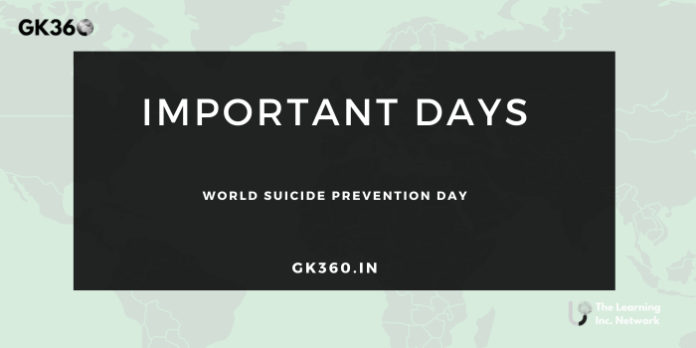World Suicide Prevention Day 2024: Changing the Narrative on Suicide
Introduction
World Suicide Prevention Day (WSPD) is observed annually on September 10 to raise awareness about suicide prevention and mental health. Established in 2003 by the International Association for Suicide Prevention (IASP) in collaboration with the World Health Organization (WHO), this day serves as a global initiative to:
- Highlight that suicide is preventable.
- Promote education and awareness about mental health.
- Advocate for policy changes and improved mental health services.
The 2024-2026 theme, “Changing the Narrative on Suicide,” emphasizes the need to shift public perception about suicide, encourage open dialogue, and foster a compassionate approach to mental health.

Table of Contents
- Suicide: A Global Health Challenge
- Breaking the Stigma: Talking About Suicide
- The Importance of Open Dialogue
- Collective Responsibility in Suicide Prevention
- FAQ: Understanding Suicide Prevention
- Conclusion: Changing the Narrative, Saving Lives
Suicide: A Global Health Challenge
Suicide is a major global public health concern. According to WHO, more than 700,000 people die by suicide each year, averaging one death every 40 seconds.
For every suicide, many more attempt it or experience suicidal thoughts. The emotional, social, and economic consequences of suicide extend beyond individuals, impacting families, communities, and entire societies.
Breaking the Stigma: Talking About Suicide
One of the biggest barriers to suicide prevention is stigma.
- Many societies still consider suicide a taboo, preventing open discussions.
- People struggling with suicidal thoughts often fear being judged or seen as weak.
- The lack of awareness leads to misunderstanding and silence, which can worsen isolation and hopelessness.
The three-year theme (2024-2026), “Changing the Narrative on Suicide,” seeks to challenge misconceptions and normalize mental health conversations. It encourages:
- ✔ Open discussions about suicide and mental health.
- ✔ Removing blame from those struggling.
- ✔ Treating suicide as a medical concern, not a moral failure.
The Importance of Open Dialogue
Talking about suicide can save lives.
- A supportive environment allows individuals to express their pain without fear of judgment.
- Honest conversations break down isolation and help people realize they are not alone.
- Raising awareness leads to better policies, support systems, and suicide prevention programs.
Governments, organizations, and communities must work together to improve mental health literacy and offer crisis intervention services. Schools, workplaces, and local communities play a crucial role in fostering environments where mental health conversations are encouraged.
Collective Responsibility in Suicide Prevention
Preventing suicide requires collaborative action:
- ✔ Governments must allocate sufficient funding to mental health services.
- ✔ Schools and workplaces should implement mental health education and wellness programs.
- ✔ Communities must foster inclusivity, ensuring no one feels alone or unheard.
At a personal level, you can make a difference:
- ✅ Check in with friends and loved ones who may be struggling.
- ✅ Listen without judgment if someone opens up about their feelings.
- ✅ Encourage professional help, such as therapists, crisis hotlines, or support groups.
If someone mentions suicidal thoughts, take it seriously. Even a simple “How are you really doing?” can be the first step toward offering support.

FAQ: Understanding Suicide Prevention
1. Why is World Suicide Prevention Day important?
WSPD raises awareness, reduces stigma, and encourages people to take action in supporting mental health initiatives globally.
2. How can I help someone who is struggling with suicidal thoughts?
- Listen without judgment and offer emotional support.
- Encourage professional help from a therapist or mental health expert.
- Check in regularly to let them know they’re not alone.
3. What are the warning signs of suicide?
- Expressing feelings of hopelessness or worthlessness.
- Withdrawal from family, friends, or social activities.
- Increased use of alcohol or drugs.
- Talking about wanting to die or feeling like a burden.
4. What resources are available for suicide prevention?
- Crisis hotlines (e.g., 988 Suicide & Crisis Lifeline in the U.S.).
- Local mental health organizations offering free support.
- Online therapy platforms and mental health support groups.
Conclusion: Changing the Narrative, Saving Lives
World Suicide Prevention Day is a reminder that suicide is preventable.
The 2024-2026 theme, “Changing the Narrative on Suicide,” calls for greater awareness, compassion, and policy improvements to create a world where no one suffers in silence.
By encouraging open conversations, promoting mental health education, and supporting those in crisis, we can build a society where everyone feels valued, heard, and supported.
Key Takeaways Table
| Aspect | Details |
|---|---|
| Event Name | World Suicide Prevention Day 2024 (WSPD) |
| Date | September 10, 2024 |
| Established By | International Association for Suicide Prevention (IASP) & WHO |
| 2024-2026 Theme | “Changing the Narrative on Suicide” |
| Global Suicide Statistics | 700,000+ suicides per year, one every 40 seconds (WHO) |
| Main Objectives | Raise awareness, reduce stigma, promote mental health services |
SEO-Driven Tags
- World Suicide Prevention Day 2024
- Suicide Prevention Awareness
- Mental Health and Suicide Prevention
- Changing the Narrative on Suicide
- Suicide Prevention Strategies
- Suicide Awareness and Support
- Global Suicide Prevention Efforts





